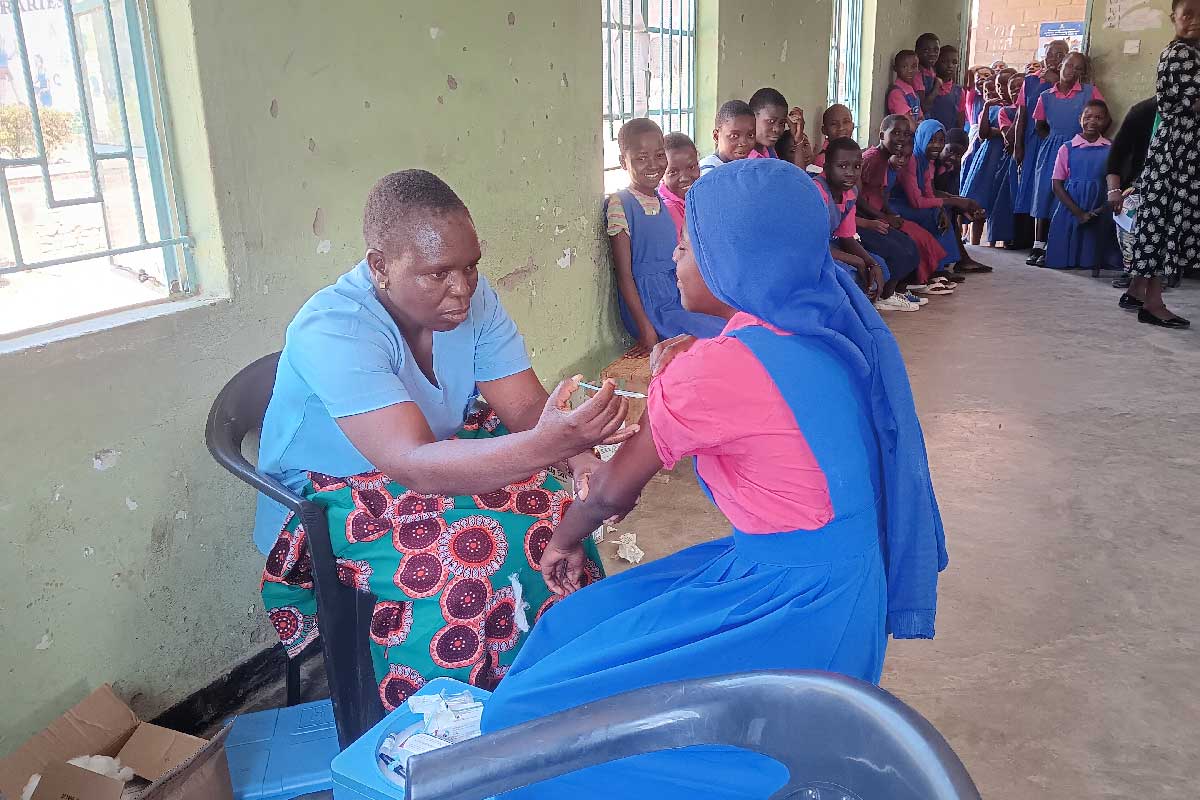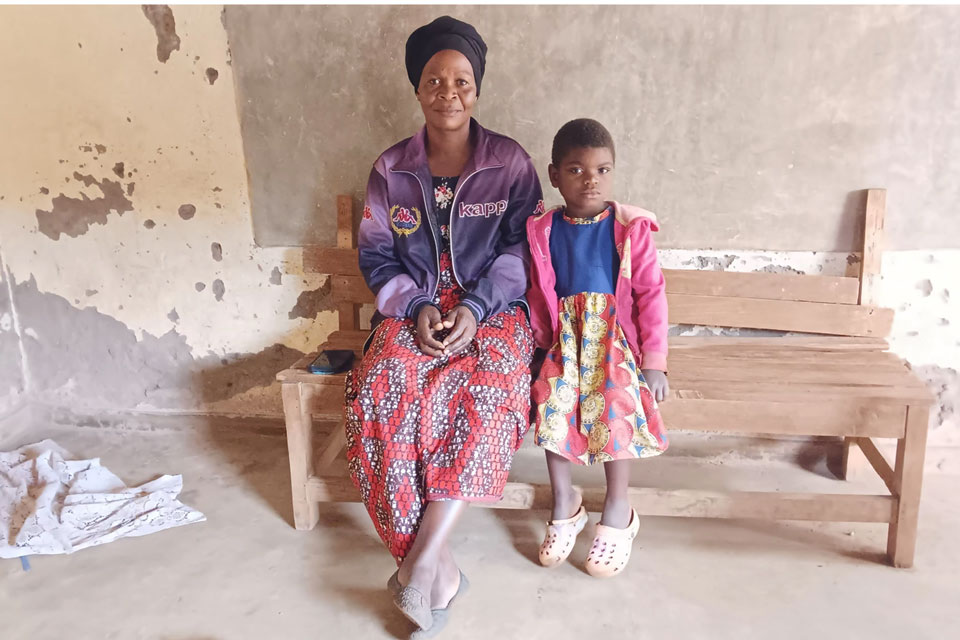Malawi’s massive HPV campaign renews national fight against cervical cancer
Malawi’s cervical cancer rates remain among the world’s worst. But now the country is doubling down on its efforts to turn the tide against a preventable disease.
- 21 November 2025
- 5 min read
- by Benson Kunchezera

Under a scorching late-October sun, laughter and chatter filled the air at Mbayani 1 Primary School in Blantyre, Malawi. A white van painted with brightly coloured health messaging was parked outside the schoolyard, its loudspeakers echoing through the neighborhood: “Protect our girls, prevent cervical cancer – get vaccinated today!”
Inside, rows of girls in blue uniforms waited patiently for their turn to receive the human papillomavirus (HPV) vaccine – a simple jab with the power to protect them from Malawi’s deadliest cancer. Health workers moved swiftly, ensuring each girl was registered, informed, and – because needles are scary – comforted, before she received her shot.
For Judith Jali, Senior Health Surveillance Assistant with the Expanded Programme on Immunization (EPI) at Mbayani Health Centre, this moment represented both hope and the culmination of a lot of hard work.
“We are very concerned about the increasing number of women diagnosed with cervical cancer,” she said. “The HPV vaccine gives us a powerful tool to prevent future cases, especially if we can reach girls before they become exposed to the virus.”
The campaign had started smoothly, she said, crediting strong community engagement and school-based sensitisation meetings with parents, headteachers, and staff. “We haven’t faced major challenges yet,” Jali adds. “People are keen. The trainings we held before the roll-out made a big difference.”
Race to catch up
The HPV Multi-Age Cohort (MAC) campaign – launched by Malawi’s Ministry of Health with support from Gavi and the World Health Organization (WHO) – targets girls aged 9 to 18 years. Traditionally, HPV vaccination programmes focused only on those between 9 and 14, but this approach aims to reach the girls who missed out on vaccination in their turn.
This vaccine has been part of Malawi’s routine immunisation schedule since 2019. That year, 73% of eligible girls received the vaccine. Then came a sequence of disasters: COVID-19, then Cyclone Freddy. Coverage rates cratered.
Efforts to raise that rate have made headway: where an estimated 13% of eligible girls had received an HPV shot in 2022, by 2023, that figure stood at 68%.
But girls who had aged out of eligibility by then were left unprotected. Enter the MAC: an essential patch for Malawi’s broader project to curb cervical cancer.
In Blantyre, the roll-out ran from 27–30 October 2025. Outreach teams were busy – those moving between Mbayani 1 and Mbayani 2 Primary Schools, for instance, reported vaccinating an average of 300 to 400 girls per day.
Among the first in line was Memory Cornelius, a 12-year-old Standard 7 pupil. She smiled proudly after receiving her dose. “I am happy to be protected,” she says. “I learned from health officials that getting vaccinated early is the best way to avoid suffering later. I want all my friends to take the vaccine too.”
For health workers like Esther Ndlovu, another Health Surveillance Assistant in the area, the girls’ enthusiasm is encouraging. “This time the turnout is much better than before,” she explains. “People have heard about HPV through roadshows, radio programmes, and meetings in schools. Parents are now coming forward because they understand the importance of this vaccine.”
Still, challenges remain – especially in reaching girls who are not in school. “We want everyone covered,” Jali emphasised. “Whether in school or not, every eligible girl deserves protection.”
According to Ministry of Health statistics, cervical cancer still accounts for 37% of new cancer cases among Malawian women. Every year, an estimated 2,300 women die from the disease – roughly two thirds of those diagnosed. Between January and October 2025, Malawi’s largest health district, Mzimba, screened 300 women screened for cervical cancer. Sixty of them were found to have precancerous lesions, while 24 were diagnosed with the disease.
These numbers, health officials say, underscore the urgent need for preventive measures against what is an eminently preventable illness.
Awareness, access, and the battle ahead
The vast majority of cases of cervical cancer are caused by persistent infection with certain types of HPV, which are transmitted through sexual contact. The vaccine is most effective when given before exposure – ideally between the ages of 9 and 14. That’s why schools remain central to the roll-out strategy.
But ensuring equitable access remains a challenge. In rural Malawi, limited awareness, long distances to health centres and cultural misconceptions continue to hinder uptake.
Organisations like Médecins Sans Frontières (MSF) have been instrumental in supplementing the government’s efforts to addressing these barriers, particularly in Blantyre and Chiradzulu districts, where the burden is highest. Since 2018, MSF has been supporting screening and treatment services, filling gaps in a health system where radiation therapy – the standard treatment for cervical cancer – is still unavailable.
“Prevention through vaccination is our best defence right now,” said one MSF health coordinator. “If we can reach every eligible girl, we can drastically reduce new cases within a generation.”
Have you read?
Turning the tide
Back in Mbayani, the vaccination drive continues at a steady pace. Groups of mothers stand nearby, chatting and watching as their daughters line up. Health workers move from classroom to classroom, clipboards in hand, ensuring every girl leaves vaccinated and smiling.
For many here, the campaign represents hope – a chance to end a disease that has claimed too many lives. “This opportunity comes once,” says Ndlovu. “If our girls are protected now, they won’t have to face the pain that so many women have suffered. We owe them that.”
As the HPV MAC campaign gathers momentum across Malawi, it carries with it a quiet promise – that through prevention, education and persistence, the country can finally turn the tide against cervical cancer.







